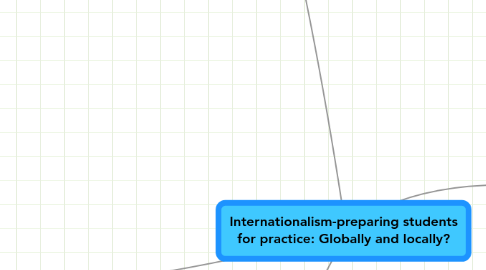
1. Participants
1.1. Italy
1.1.1. Student 6th year
1.1.2. Interest in GLobal Health
1.2. ?
1.3. ?
1.4. Lisboa
1.5. Canada
1.5.1. Western Ontario
1.5.2. Global Health Office
1.5.3. Internationalisation is priority
1.5.4. New node
1.6. thailand
1.6.1. Former nurse
1.6.2. Working on medical curriculum
1.7. The Netherlands
1.8. Australia
1.8.1. Career advice
1.8.2. Monash University
1.8.3. Integrating Global health in curriculum
1.9. USA
1.9.1. University of Michigan
1.9.2. Health equity
1.9.3. Global health
1.10. Italy
1.10.1. University of Milano
1.10.2. LEarn aboutInternationalism
1.11. Denmark
1.11.1. Student
1.11.2. Works on improving medical education
1.11.3. Interest in International relations
1.12. Denmark
1.12.1. Student 2x
1.12.2. Faculty which has not much travel abroad activities
1.13. UK, Manchester
1.13.1. GP
1.13.2. Medsin UK
1.13.3. Teaching Fellow Job
1.13.4. Inspiration
1.14. Nottingham/London
1.14.1. Global Health Education
1.14.2. Junior doctor
1.15. USA
1.15.1. President of AMSA
1.15.2. Interested in Global health
1.16. ?
1.17. UK, London
1.17.1. Cultural diversity internally
1.17.2. Content of internationalisation curriculum
1.17.3. Covering cultural differences
1.17.4. Reflection
1.17.5. How to learn positive lessons from difference
1.17.6. Global migration
1.18. Australia
1.18.1. Global health
1.18.2. Community medicine
1.19. Thailand
1.19.1. Global health
1.20. Australia
1.20.1. Director of medical studies
1.20.2. electives abroad
2. Conceptualization of the topic
2.1. Very diverse participants
2.2. Global and international = cultural experience
2.3. UK
2.3.1. Final year electives
2.3.1.1. 8 weeks, much travel abroad
2.3.2. Many graduates work abroad
2.4. Questions to work on
2.4.1. What do you understand by "global health"
2.4.1.1. In international practice at home/abroad
2.4.1.1.1. Religion
2.4.1.1.2. Language
2.4.1.1.3. Culture
2.4.1.2. Understanding different contexts
2.4.1.3. etc. -- not all minuted
2.4.2. What "global health" needs to be in the curriculum?
2.4.2.1. Does it need to be in?
2.4.2.2. Do all need to know?
2.4.2.2.1. Elective?
3. Small working group outcomes
3.1. Group1
3.1.1. Every single model some aspects
3.1.2. e.g. respiratory medicine
3.1.2.1. Wider context
3.1.3. Knowledge
3.1.3.1. Concepts related to local, national, global issues
3.1.3.2. in each course subject area
3.1.4. Systems way
3.1.4.1. e.g. asking about travel history in respiratory medicine
3.1.4.1.1. instead of solely case based
3.1.5. Behaviors
3.1.5.1. Thinking of wider global issues?
3.1.5.2. Assessment
3.1.5.2.1. Portfolios
3.1.5.2.2. OSCEs
3.2. Group 2
3.2.1. Knowledge
3.2.2. Communication skills
3.2.3. Not just a module: theme running through curriculum
3.2.4. Indigeneous populations
3.2.5. Assessment
3.2.5.1. Formative
3.2.5.1.1. What do you do with?
3.2.6. When going abroad
3.2.6.1. To which extent can the student learn
3.2.6.2. to which extent can the student contribute
3.2.7. British / Australian / Italian - group
3.2.8. Do students have to travel abroad during studies?
3.3. Group 3
3.3.1. Embed in evidence based medicine
3.3.2. earlier groups
3.3.3. "everybody has to do something"
3.3.3.1. What's the host getting out of it?
3.3.3.1.1. Win-win
3.3.3.2. Teaching abroad
3.3.3.3. Underserved communities
3.3.3.4. Just a different context than home
3.4. Discussions
3.4.1. Medicine seems to be lagging behind compared to other fields
3.4.2. We want to make real relations with institutions where our students go
3.4.3. We want more equal relations with our partners
3.4.3.1. Canada!
3.4.3.2. Very complicated
3.4.3.3. Requires lots of efforts
3.5. Group 4
3.5.1. Community based medicine in Thailand: much global health
3.5.2. Anything worth teaching is worth evaluating
3.5.3. It's hard: how to measure success
